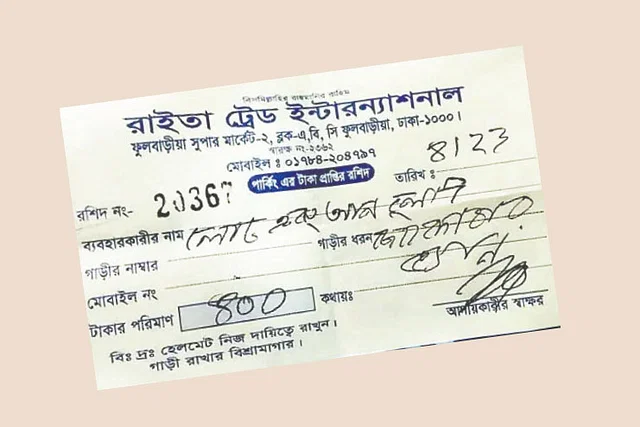The transition of political power in Bangladesh has led to a significant shift in the control of the country’s transport sector. The office of the Dhaka Road Transport and Bangladesh Road Transport Owners’ Association, located on the fourth floor of the Unique Heights building in Eskaton, Dhaka, has recently come under new management. Under the Awami League government, this office played a crucial role in overseeing the nation’s transport operations. However, following the recent fall of the government amid widespread student protests, leaders aligned with the Bangladesh Nationalist Party (BNP) took control of the office on August 13.
Control Over Transport Sector Finances
A Prothom Alo investigation has revealed that approximately BDT 2,000 crore is collected annually from the transport sector under the guise of various fees associated with owners’ and workers’ associations. Every day, BDT 70 is collected from each bus and truck across the country, in addition to other significant sums collected under various pretexts such as gate passes, union membership fees, and more. With the change in government, control over these extensive extortion activities in the transport sector has also shifted, as noted by several industry insiders.
During the Awami League’s 15-year tenure, Khandaker Enayet Ullah, Vice-President of Dhaka Metropolitan South Awami League, and Jatiya Party leader Moshiur Rahman (Ranga) managed the transport owners’ associations across the country. However, following the change in power, Enayet has left the country, and Moshiur Rahman has gone into hiding. Taking advantage of this power vacuum, on August 10, a group of transport leaders led by Saiful Islam Bhuiyan, a joint convener of the BNP’s Comilla North District, forcibly took over the office at Unique Heights. By August 13, they had officially seized control, subsequently forming a 31-member convening committee under Saiful’s leadership.
Saiful Islam had previously served as the General Secretary of the Dhaka Road Transport Owners’ Association during two terms of BNP governance, with BNP Standing Committee Member Mirza Abbas as his president. Sources indicate that Mirza Abbas is again providing support to the new leadership. Saiful Islam, who owns the Elliotganj Express transport company, stated to Prothom Alo that they have taken on this responsibility to restore order in the transport sector and will make every effort to curb extortion. When questioned about Mirza Abbas’s involvement, Saiful mentioned that Abbas is currently preoccupied but will continue to serve as an advisor.
Impact on Transport Operations
Following the shift in control, buses operated by Ena Transport, owned by Khandaker Enayet Ullah, have ceased operations on the Dhaka-Mymensingh route. Buses on other routes, including those to Sylhet, are also facing potential disruptions. According to sources within the transport industry, buses previously operating under the Ena Transport banner, including those owned by Enayet, Saiful, Aminul Haque Shamim (a Mymensingh Awami League leader), and worker leader Osman Ali, are now operating under the name “United.” Control of key terminals in the capital, such as Sayedabad and Gabtoli, has also shifted, with Mohakhali expected to follow suit. This pattern is reportedly being observed nationwide.
For years, the Bangladesh Road Transport Owners’ Association and the Dhaka Transport Owners’ Association operated from the same office. After the Awami League assumed power in 2009, the association’s office was located in the BRTC building in Motijheel. Approximately six years ago, the office moved to the 8,000-square-foot space in Unique Heights, with an estimated BDT 15 crore spent on its purchase and decoration. Additionally, the Bangladesh Bus-Truck Owners’ Association, based at the Gabtoli Bus Terminal, is also facing changes in leadership. Ramesh Chandra Ghosh, the owner of Shyamoli Transport and president of the association, along with General Secretary Abu Raihan, have reportedly ceased visiting the office. Control of the office has now been assumed by local BNP leader and Hanif Transport owner, Kofil Uddin. During the BNP-Jamaat alliance government, this association was controlled by former BNP MP GM Siraj.
However, Kofil Uddin has denied taking control of the office, stating that the leaders are not attending and that employees are currently managing the association. Meanwhile, Shajahan Khan, who long held control over the Bangladesh Road Transport Workers Federation, has also stopped attending the organization’s headquarters in Motijheel following the power shift.
Nationwide Shifts in Control
This power vacuum has led to changes in control at various terminal and district-based union offices that were previously under Shajahan Khan’s authority. In Dhaka, pro-BNP figures have taken over worker union offices at Sayedabad, Joykali Temple, and Gabtoli bus terminals. Similar changes are occurring outside the capital, with offices in Rajshahi, Rangpur, Syedpur in Nilphamari, and Jamalpur experiencing shifts in control away from Shajahan Khan’s influence.
Despite having representatives from various political parties, including BNP, Bikalpa Dhara Bangladesh, and Jatiya Party, the federation was primarily controlled by Shajahan Khan. During the BNP-Jamaat government, Habibur Rahman Khan, a BNP leader, held significant influence as the federation’s general secretary. Although Rahman is no longer alive, control is expected to shift to Rahim Bakhsh and Shamsur Rahman Shimul Biswas, with a possibility that a BNP figure might eventually replace Shajahan Khan.
Shamsur Rahman Shimul Biswas mentioned that with the arrival of a new government, certain individuals enter the federation, and when the government changes, they leave. He emphasized that the BNP is committed to preventing forced takeovers and politicization within the federation. Regarding his role, Biswas stated that he had not been active for the last 18 years but would consider his involvement once the situation stabilizes.
Political Influence in Transport Sector
A Transparency International Bangladesh (TIB) report published on March 5 revealed that BDT 1,059 crore is collected annually from privately owned buses and minibuses in the form of extortion. The funds are distributed among political figures, police, BRTA officials, transport associations, and municipal representatives.
Prothom Alo’s investigation also highlighted three primary methods of extortion within the transport sector:
- Daily extortion under the name of owner-worker associations.
- Fees for route permits.
- Daily charges for webil or gate pass fees.
With nearly 300,000 registered buses, minibuses, and trucks in the country, an estimated BDT 1,885 crore is collected annually through these means.
The Bangladesh Road Transport Workers Federation comprises 249 registered transport worker associations. For years, Shajahan Khan has led the federation, and his family owns several bus companies. His son, Asibur Rahman Khan, serves as the president of the Madaripur District Bus Owners’ Association.
Moshiur Rahman, a Jatiya Party leader, serves as the president of the Bangladesh Road Transport Owners’ Association, while Khandaker Enayet Ullah, an Awami League leader, is the general secretary. Under their leadership, associations of transport owners exist in all 64 districts and major cities across the country.
Extortion is conducted through over 300 owner-worker committees, in addition to unregulated extortion points such as ferry ghats and toll plazas.
Political Control of Transport Sector
During the Awami League’s 15-year rule, many MPs and leaders from the party were deeply involved in the transport business, leading owners’ and workers’ associations in Dhaka and various districts.
The Z N Corporation, owned by the family of Narayanganj MP Shamim Osman, operates a bus company named Shital Transport. Transport extortion in Narayanganj was entirely under the Osman family’s control.
Anwarul Azim, the MP from Jhenaidah who was murdered last May, was the vice-president of the Bangladesh Road Transport Owners’ Association and the general secretary of the Kaliganj Upazila Motor Owners’ Association. Former MP Abul Kalam Azad is the president of the Gaibandha Truck Owners’ Association, while former MP Shanuar Hossain served as the organizing secretary of the Central Road Transport Owners’ Association and the president of the Sherpur District Association.
Pankaj Nath, a former general secretary of the Awami League’s Volunteer League and an MP, owns buses under the name Bihanga Transport, which operate on several routes in Dhaka. Former MP and Jubo League general secretary Mainul Hossain Khan, also known as Nikhil, is the chairman of Chalan Transport Company. Anwar Majumder, brother of former MP Kamal Ahmed Majumder, owns Mohona Transport and is a leader of the Awami League’s Metropolitan North unit.
Faridur Rahman, also known as Iran, the organizational secretary of the Volunteer League and a councilor of the Dhaka North City Corporation, is the chairman of Desh Bangla Transport Company. He also controlled the legunas in the Farmgate area. Glory Express, owned by the brother of former IGP AKM Shahidul Haque, AKM Ismail Haque, operates in Dhaka. He is the joint general secretary of the Shariatpur District Awami League and chairman of the Naria Upazila Parishad.
According to Iftekharuzzaman, Executive Director of Transparency International Bangladesh (TIB), the primary goal of political leaders seizing control of transport sector offices after a change in government is to dominate extortion activities. This extortion leads to disorder in the transport sector, resulting in inflated fares and overall chaos, with the general public bearing the










